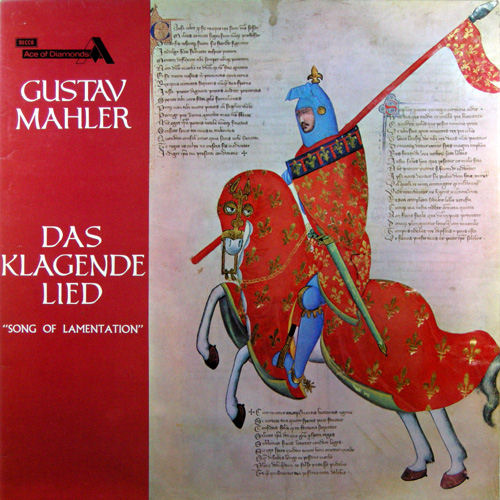A propos des chefs alcooliques – On alcoholic conductors

| L’idée de ce papier m’est venue alors que je viens d’acquérir en soldes à la FNAC la 10e de Mahler par Daniel Harding chez DG avec Vienne : un Diapason d’or à 7€, je me précipite ! Wrong again… Ce n’est pas mal joué (Vienne…) mais ça n’intéresse guère. L’effort marketing de la DG est impressionnant : photo du chef en couverture, 3 photos à l’intérieur et une quasi-interview du chef en 3 langues, avec pas mal de platitudes.
Je ne l’ai pas remis récemment sur ma platine, mais j’ai toujours pour cette œuvre le souvenir bien présent de la version Wyn Morris chez Philips. C’est à cent coudées au-dessus de la version DG en termes d’impact émotionnel et de présence sonore. Les quatre chefs mahlériens de la 2e partie du XXe siècle, dans l’ordre Kubelík, Solti (belle 1e et superbe 6e) et enfin Bernstein et Haitink se refusèrent à diriger cette reconstitution. Je ne connais pas les versions récentes – à part donc Harding – (Chailly, Rattle…). Sans doute les anciens avaient-il raison de ne pas diriger cette œuvre : on ne croît guère à la reconstitution de Cooke ou d’autres, mais ce solo de flûte dans le dernier mouvement… J’en reviens à Wyn Morris, en signalant qu’il avait signé pour moi la plus belle version discographique de Das Klagende Lied (jusqu’à ce que je mette la main sur l’extraordinaire concert de Kubelík à Munich en 1979…). Wyn Morris était un chef (1929-2010) qui fut très mésestimé en France, notamment dans Mahler (Henri-Louis de la Grange n’y étant pas pour rien). Il était célèbre en Angleterre pour ses interprétations du répertoire romantique, mais son penchant marqué pour l’alcool lui fit prendre une tournure quasiment auto-destructrice. Au moins deux autres chefs célèbres étaient connus pour diriger souvent « imbibés » : Charles Munch et Sir John Barbirolli. Est-ce pour cela que l’on chérit leurs disques et concerts ? Dans quelle mesure cet état leur permettait-il de se transcender ? Un autre cas était celui de Kubelík, qui dirigeait en étant sobre, mais dont on raconte qu’il avait toujours deux Pilsen bien fraîches pour se désaltérer après le concert et dont on se souvient du témoignage de Barenboïm : après avoir dirigé Mahler avec l’orchestre de Paris à Pleyel au début des années 80, je n’avais pu que le voir passer en coulisses, colosse transpirant à l’air exténué. Barenboïm raconte que Kubelík vint le voir ce soir-là après le concert dans son appartement, au-dessus de la salle Pleyel ; sa mère (!) lui demanda s’il voulait un verre d’eau… Kubelík finit dans la soirée toutes les bouteilles d’alcool présentes ! |
The idea of this paper came to me as I just acquired Mahler’s 10th by Daniel Harding in Vienna with DG: a Diapason d’or for 7 €, I rushed! Wrong again … It is not played badly (Vienna ..) but it does not present much interest. The marketing efforts of the DG is impressive: picture of the conductor on the cover, 3 more photos inside and a quasi-interview in three languages, with lot of platitudes.
I have not recently put it on my LP player, but I remember well the Wyn Morris version (Philips). This one has much more emotional impact and presence of sound than the recent DG recording. The four Mahlerian conductors of the 2nd half of the twentieth century, in order Kubelík, Solti (beautiful 1st and a stunning 6th) and finally Bernstein and Haitink refused to conduct the reconstruction. I do not know the latest versions – apart Harding – (Chailly, Rattle …). Doubtless the ancients were right not to conduct this work: we do not trust these reconstructions (Cooke or others), but the flute solo in the last movement … I return to Wyn Morris, noting that he had signed for me the most beautiful version of Das Klagende Das Lied (until I put a hand on the Kubelík’s extraordinary concert in Munich in 1979 … ). Wyn Morris was a conductor (1929-2010) who has been very underrated in France, especially in Mahler (Henri-Louis de la Grange is not for nothing). He was famous in England for his interpretations of the Romantic repertoire, but his penchant for alcohol made him take an almost self-destructive turn. At least two other famous conductors were known for conducting « soaked »: Charles Munch and Sir John Barbirolli. Is it that why we cherish their records and concerts? To what extent this state allowed them to transcend their interpretations? Another case was that of Kubelík which conducted being sober, but it has been said that he had two fresh Pilsen to drink after concert and we remember the testimony of Barenboim: after conducting Mahler with the Orchestre de Paris at the Salle Pleyel in the early 80s, I could only see him behind the scenes, a giant sweaty and exhausted. Barenboim said that Kubelík came to see him that night after the concert in his apartment above the Salle Pleyel, his mother (!) asked him if he wanted a glass of water… Kubelík ended the evening finishing all available alcohol! |
 |
